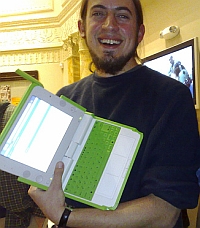What better way to end the week in Washington, DC than with a good XO geek fest? How about one with your favorite OLPC News writers at a local pub?
This Friday, we'll have Mike Lee, Wayan Vota, Jon Camfield, and in from OLPC Austria, Christoph Derndorfer, at the Looking Glass Lounge in Petworth.
On tap will be a lively discussion of all things One Laptop Per Child as the beer brings out our brilliance in everything else. We'll also have a collection of XO laptops for public use. If you're around, do come join us:
OLPC News DC Meetup.
Friday, March 28
Looking Glass Lounge
3634 Georgia Ave NW (map)
6pm till we stumble home



I finally get to not be the only guy without an XO at a meetup! Now, if only update.1 works...
I would look first at all, for the needs of the persons in the developing world…
1. The first need is the lack of books. So, the first thing is to consider how to deliver e-books which, in contrary to the US system, in most developing countries are standardized through all the educational system. So, the XO should be able to load the standardized books (increase the hard disk). I suggest instead of looking as an external tool “to self learn”, it should be a tool able to help the educational system. For example the idea of creating a rotating screen to transform the XO into an e-book , was genial!!
2. If the XO is to be designed to help the educational system, it should be noted that more than 50% of the population is illiterate. There are a lot of teenagers/adult literacy programs… and this means a slight bigger keyboard, and the possibility to load “web” customized software …
3. There should not be an “obsession” to connect to the internet (rural Africa does not have it as widely available…), but use wi-fi to facilitate the teacher’s work.Do a link between the teacher and the students to monitor and correct their work during the class…or even the homework, should I say “e-homework”. This also means the use of touch screens and digital pens. Teachers should be able to interact with each student, and this will be a huge help, especially because in Africa the classes often contain 40 (fourty) students. What a great help and idea to have a system that the teacher can monitor each student with a glance of the eye!
4. I think also, students main priority is to connect/network with other colleagues, not internet, as students do in the cities through the phones. Connection can be done using email (through the wi-fi antenna on the top of the roof of the school)
5. However, the internet capability/possibility must exist, because if in the rural Africa this connection is rare, it does, however, exist, as well as in the cities. What a great way also to have distance education courses “on the move”, for those with access to internet?
6. As this is redesigned, the main instruments are e-mail and ways to write/communicate. So the system should be able to run Ubuntu…and pre load with OpenOffice. Ah, and this will also enable to transform it into a multi language, since the universe does not speak English only.
7. Although this is not a business company, a business model has to be developed/implemented if XO has to find a way out. For example, able to answer the most basic questions, that at the moment nobody can find a quick answer: ”Where can I buy XO? How much does it cost?”
8. Finally, I believe that other uses can be derived such as in the health sector. Today there are programs to gather information with PDA, send the information through an own wi-fi system or a celular phone access point, but every manager will tell you that he/she prefers a kind of XO because PDA “disappear” quickly…so, derivatives to other sectors will grow quickly, IF the XO can de “adapted” to Multilanguage and multi situations.
9. And finally, do not worry with the “competition”, but focus on the product and listen to the end user. Most African Governments do not have the money to buy…the donors will…as long as there is an evidence/user-based proved product.